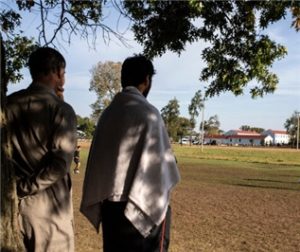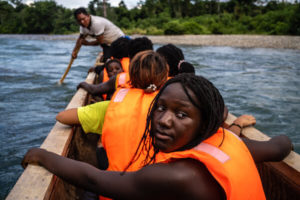Plague Journal, More Tears
Sunday morning is gray. There is a damp heaviness in the air. It is supposed to rain. Today if we do not receive a good rain, will some of the trees in my neighborhood, trees in my yard die? The drought has been prolonged, for most of the summer. Fall, a season of falling temperature, the unsettlement of summer heat and lassitude — rain is the gift-of-life that prepares vegetation for winter’s sleep. Now, leaves appear dusky green, a revelation of suffering, stress of a thirsty earth. The earth is warming…
What ought we to give for the smile of a tree?
At an age when, for lack of experience, one takes to philosophy,
I determined to write a thesis like everyone else.
What subject to choose?
I wanted one to be both familiar and unwonted.
The moment I imagined that I had found it,
I hastened to announce my discovery to my professor.
“What would you think of A General Theory of Tears?
I feel ready to start work on that.”
“Possibly,” he said, “but you’ll have your work cut out,
finding a bibliography.”
“That doesn’t matter so much.
All History will afford me its authority,” I replied
in a tone of triumphant impertinence.
But when, in his impatience,
he shot me a look of disdain, I resolved then and there
to murder the disciple in myself.
— Excerpt All Gall Is Divided, by Emile Cioran
These reports from the weekend edition of the New York Times:

As Afghan refugees wait for homes in the U.S., military bases are turning into small cities.
About 53,000 Afghans have been living on eight military installations since the summer. Afghan evacuees said they were grateful for the warm reception they have received, but for many, the long wait has been grueling.
One reason for the delay is housing — many wish to settle where they have friends or relatives, but officials have said that a dearth of affordable apartments could postpone their resettlement.
-*-

Migrants are surging at the Mexican border. Tens of thousands are passing through a deadly South American jungle to get there.
The the Darien Gap, a roadless, lawless land bridge connecting Colombia and Panama, was considered so dangerous that only a few thousand people a year tried to cross it. But the economic devastation wrought by the pandemic in South America has been such that 95,000 migrants, most of them Haitian, attempted the crossing in the first nine months of the year.
“We very well could be on the precipice of a historic displacement of people in the Americas toward the United States,” a former national security adviser said. “When one of the most impenetrable stretches of jungle in the world is no longer stopping people, it underscores that political borders, however enforced, won’t either.”